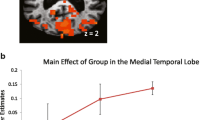Abstract
This study aimed to assess the efficacy and specificity of direct computer-assisted memory retraining (CR) in MS patients, in comparison to non-specific retraining, while controlling for severity of impairment, psychiatric symptoms and retest effects. Sixty patients with definite MS and a stable clinical condition were selected. All were assessed neuropsychologically and divided into three matched groups. One group received an 8-week specific CR programme (SCRP) and another received a non-specific 8-week CR programme (NCRP) to retrain attention; a third (control) group received no treatment. After the programmes were completed, all patients were reexamined with the same test battery. Patients were impaired on all 11 memory and attention tests at baseline. Those who received SCRP improved on 7 memory outcome measures, compared to only 1 in the NCRP group and none in the control group. Attention training had no significant effect on relevant outcome measures. Some non-retrained patients showed deterioration of cognitive performance at retest. These results indicate that direct memory training in MS patients is effective in the short-term and is specific. In selected cases, benefits extended to everyday life activities.
Sommario
Abbiamo valutato l'efficacia e la specificità della riabilitazione diretta della memoria in pazienti con sclerosi multipla (SM) clinicamente definita. Sessanta pazienti con SM in fase stabile sono stati suddivisi in tre gruppi di pari numerosità e paragonabili per disabilità alla EDSS (expanded disability status scale) e durata di malattia e valutati con una batteria di 11 test di memoria e attenzione. Al primo gruppo è stato offerto un training della memoria assistito da computer consistente in due sedute settimanali di 45 min ciascuna per un periodo di 8 settimane. Al secondo gruppo è stato offerto un analogo training mirato a migliorare l'attentione. Il terzo gruppo estato solo sottoposto alle valutazioni neuropsicologiche di ingresso e termine dello studio. All' ingresso, i pazienti hanno mostrato deficit significativi alla batteria di valutazione. Dopo il trattamento , il gruppo sottoposto a training specifico ha mostrato miglioramenti significativi in 7 degli 11 test, il gruppo assegnato al training aspecifico ha migliorato in un solo test, mentre il gruppo non trattato e rimasto sostanzialmente stabile, nonostante alcuni componenti abbiano evidenziato un decremento delle prestazioni cognitive. Il training dell'attenzione non ha prodotto variazioni significative della velocità di risposta I risultati di questo studio suggeriscono the il training diretto della memoria sia, almeno a breve termine, efficace, e the sia specifico. In alcuni casi abbiamo potuto rilevare the i benefici si estendono alle attivitd della vita quotidiana.
Similar content being viewed by others
References
Schwartz CE, Kozora E, Zeng Q (1996) Towards patient collaboration in cognitive assessment: Specificity, sensitivity and incremental validity of self-report. Ann Behav Med 18:177–184
Richardson JTE (1996) Memory impairment in multiple sclerosis: Reports of patients and relatives. Br J Clin Psychol 35:205–219
Rao SM (1997) Neuropsychological aspects of multiple sclerosis. In: Raine CS, McFarland HE Tourtelotte WW (eds) Multiple sclerosis: Clinical and pathogenetic basis. Chapman & Hall, London, pp 357–363
Beatty WW, Monson N (1991) Metamemory in multiple sclerosis. J Clin Exp Neuropsychol 13:309–327
Kujala P, Portin R, Ruutiainen J (1996) Memory deficits and early cognitive deterioration in MS. Acta Neurol Scand 93:329–335
Thornton AE, Raz N (1997) Memory impairment in multiple sclerosis: A quantitative review. Neuropsychology 11(3):357–366
Amato MP, Ponziani G, Pracucci G et al (1995) Cognitive impairment in early onset multiples clerosis. Pattern, predictors, and impact on everyday life in a 4-year follow up. Arch Neurol 52:168–172
Kujala P, Portin R, Ruutiainen J (1997) The progress of cognitive decline in multiple sclerosis. A controlled 3-year follow-up. Brain 120:289–297
Rao SM, Leo GJ, Bernardin L, Unverzagt F (1991) Cognitive dysfunction in multiple sclerosis. I. Frequency, pattern and prediction. Neurology 41:685–691
Thompson AJ (1996) Multiple sclerosis: Symptomatic treatment. J Neurol 243:559–565
Robertson IH (1993) Cognitive rehabilitation in neurologic disease. Curr Opin Neurol 6:756–760
Poser CM, Paty DW, Scheinberg L et al (1983) New diagnostic criteria for multiple sclerosis — guidelines for research protocols. Ann Neurol 13:227–231
Mendozzi L, Pugnetti L, Saccani M, Motta A (1993) Frontal lobe dysfunction in multiple sclerosis asassessed by means of Lurian tasks: Effect of age at onset. J Neurol Sci 115:S42-S50
Wechsler DA (1945) A standardized memory scale for clinical use. J Psychol 19:87–95
Golden CJ, Hammeke TA, Purish AD (1980) The LuriaNebraska neuropsychological battery: Manual (revised). Western Psychological Service, Los Angeles
Jonsson A, Korfitzen EM, Heltberg A et al (1993) Effects of neuropsychological treatment in patients with multiple sclerosis. Acta Neurol Scand 88:394–400
Nyenhuis DL, Rao SM, Zajecka JM et al (1995) Mood disturbance versus other symptoms of depression in multiple sclerosis. J Int Neuropsychol Soc 1:291–296
Plohmann AM, Kappos L, Ammann W et al (1998) Computer assisted retraining of attentional impairments in patients with multiple sclerosis. J Neurol Neurosurg Psychiatry 64:455–462
Sohlberg MM, Mateer CA (1987) Effectiveness of an attention-training program. J Clin Exp Neuropsychol 9:117–130
Sturm W, Willmes K (1991) Efficacy of a reaction training on various attentional and cognitive functions in stroke patients. Neuropsychol Rehabil 1:259–280
Mariani C, Farina E, Cappa SF et al (1991) Neuropsychological assessment in multiple sclerosis:A follow-up study with magnetic resonance imaging. J Neurol 238:395–400
Hohol MJ, Guttmann CRG, Orav J, et al. (1997) Serial neuropsychological assessment and magnetic resonance imaging analysis in multiple sclerosis. Arch Neurol 54:1018–1025
Author information
Authors and Affiliations
Rights and permissions
About this article
Cite this article
Mendozzi, L., Pugnetti, L., Motta, A. et al. Computer-assisted memory retraining of patients with multiple sclerosis. Ital J Neuro Sci 19 (Suppl 6), S431–S438 (1998). https://doi.org/10.1007/BF00539601
Issue Date:
DOI: https://doi.org/10.1007/BF00539601




